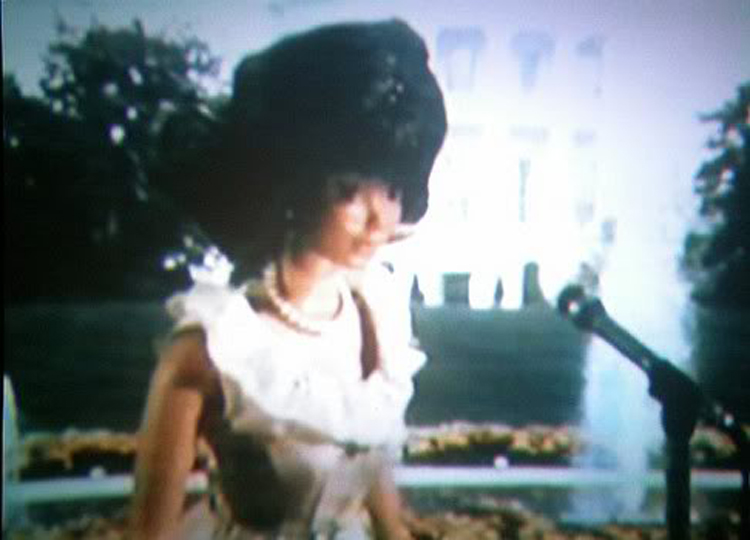 “Really, I would say that it was the first movie I saw, when I was 3 years old —”Mary Poppins“— that set in motion a kind of obsessive relationship to the big screen” said director Todd Haynes in 2013. And next week, the culmination of that obsession, and the latest addition to an increasingly impressive, coherent corpus of work, opens in limited release. “Carol,” starring Cate Blanchett and Rooney Mara (our dazzled Cannes review is here), is a film of such shimmering, heartfelt loveliness and consummate craft that it’s hard not to see it as a creative apex for Haynes. Certainly, with the awards talk it has been generating, the uniformly rapturous critical response, and a sense of its accessibility to a wider theatrical audience than he has ever reached before, it’s tempting to look at “Carol” as the Rome toward which all the roads of Haynes’ career have led.
“Really, I would say that it was the first movie I saw, when I was 3 years old —”Mary Poppins“— that set in motion a kind of obsessive relationship to the big screen” said director Todd Haynes in 2013. And next week, the culmination of that obsession, and the latest addition to an increasingly impressive, coherent corpus of work, opens in limited release. “Carol,” starring Cate Blanchett and Rooney Mara (our dazzled Cannes review is here), is a film of such shimmering, heartfelt loveliness and consummate craft that it’s hard not to see it as a creative apex for Haynes. Certainly, with the awards talk it has been generating, the uniformly rapturous critical response, and a sense of its accessibility to a wider theatrical audience than he has ever reached before, it’s tempting to look at “Carol” as the Rome toward which all the roads of Haynes’ career have led.
However, the journey to this sumptuous adaptation of the Patricia Highsmith novel “The Price of Salt,” starring an Oscar winner and an Oscar nominee, which benefits from the input of regular collaborators like DP Edward Lachman and costume designer Sandy Powell, not to mention longtime producer Christine Vachon, has not been a straight line. In fact, a glance over Haynes’ filmography, relatively short though it is, suggests less that he is moving through different phases, and more that he’s always been a multifaceted filmmaker, and each successive title has caught the light in a slightly different way.
There’s his status as New Queer Cinema pioneer, which is really based on his early feature “Poison” and a handful of shorts. There are the prismatic explorations of the lives of musicians and the music “scenes” that nourish and destroy them: “Superstar: The Karen Carpenter Story”; “Velvet Goldmine”; “I’m Not There.” There are the loving homages to the previously unfashionable genres of Classic Hollywood melodrama and the “women’s picture”: “Far From Heaven”; “Mildred Pierce.” There is the recurring collaboration with actress Julianne Moore across three completely diverse films: from paranoia drama “Safe” to Sirkian weepie “Far From Heaven” to her faux-documentary segments in “I’m Not There.”
So you can see his career as a motley collection of disparate influences, genres and aesthetics, but there exists a powerful and profound throughline, a kind of central organizing principle: all of Haynes’ films to date have been peculiarly concerned with the gulf that can exist between an individual’s private identity and public persona. Think of the repression of homosexuality due to fear of societal or familial disapproval. Or of the musician who self-creates alter egos and cultivates a public image only to find it becoming a trap. Or the ordinary housewife struggling to process a quite extraordinary desire to escape the stifling confines of her proscribed social roles. In Haynes’ films, the cages are often gilded and are often of our own making, but they are cages nonetheless.
Anticipating the arrival of “Carol,” we’ve had the pleasure and the privilege of taking a comprehensive look back through all of Todd Haynes’ films to date. And note: you can catch up with many of them soon if you’re in New York starting November 18 – 29, during the Film Society of Lincoln Center’s series, “Todd Haynes: The Other Side of Dreams.”
 “Superstar: The Karen Carpenter Story” (1987)
“Superstar: The Karen Carpenter Story” (1987)
Barely squeaking by as a feature film (at 43 minutes it’s just 3m clear of the Academy’s cut-off), Haynes’ ‘Superstar’ is a fascinating curio, and a signal of a unique sensibility that would gain exponentially in technical polish, but that would retain a very slightly askance, idiosyncratic outlook. Here, as so often in the careers of budding auteurs, constraints on resources led to highly creative solutions, most notably the decision to largely exclude real actors in favor of having a collection of Barbie dolls stand in for the onscreen characters. Of course this feels hugely appropriate in the story of the life and tragic early death of Karen Carpenter, whose anorexia and body image issues were very much a facet of the same society that taught young girls that Barbie’s unattainable vital statistics were the beauty ideal to strive for. But it also lends the film a remove that is, despite the distinct sympathy Haynes evidently feels for Karen (voiced by Merrill Gruver), both kitschily entertaining and quite scathing. A condemnation of the commodification of Carpenter’s talent by a voracious public (which again reduces her to the status of plastic plaything) it’s particularly unforgiving toward her family and friends who are portrayed as more interested in Karen’s career than her health. They’re even darkly hinted to be be partially responsible for her dysfunction, as in the shot of doll-Karen’s naked butt being spanked for some transgression or other, that comes to stand for her feelings of shame and inadequacy. And in amongst the faux-documentary sections, reconstructions, archive footage and news-flash-style “educational” segments, many of which are in dubiously sensationalist taste, and some of which can feel rather heavy-handed, Haynes further hints that Karen’s brother Richard was gay and paranoid about being revealed as such. It’s thought to be that suggestion that led to the real-life Carpenter suing the filmmakers (technically because they used the original tracks without permission), and winning, so the film, after a few successful festival showings, was withdrawn and destroyed. Rumors persist that a copy of the negative remains intact somewhere under lock and key, but mostly the film is viewable now in bootleg versions (there’s even one up on YouTube), in which the degraded, VHS fuzziness of the images (many of which were deliberately unclear to begin with) only adds to the film’s subversive, grungy, punkish energy.

